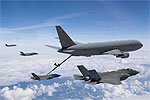Boeing Offers Next-Generation KC-46 Tanker in Republic of Korea Competition
 EVERETT, Wash., June 30, 2014 – Boeing [NYSE: BA] today formally offered to the Republic of Korea (ROK) the KC-46, the U.S. Air Force’s next-generation tanker, as Korea prepares to acquire four aircraft for its first tanker squadron.
EVERETT, Wash., June 30, 2014 – Boeing [NYSE: BA] today formally offered to the Republic of Korea (ROK) the KC-46, the U.S. Air Force’s next-generation tanker, as Korea prepares to acquire four aircraft for its first tanker squadron.
“We’ve been a strategic and industrial partner with the Republic of Korea for more than six decades and remain committed to helping Korea strengthen its defense capabilities and aerospace industry,” said Eric John, president of Boeing Korea. “With the KC-46, Korea will acquire a force-multiplier and the ability to operate seamlessly with the U.S. Air Force during combat and humanitarian relief operations.”
Boeing made the offer in response to Korea’s request for proposals for an aerial refueling tanker. Korea’s Defense Acquisition and Program Administration is expected to complete its competition by the end of this year.
The KC-46, the most advanced tanker ever built, leverages Boeing’s 75 years of expertise with air refueling systems. In addition to its refueling mission, it can transport cargo, passengers and support aeromedical evacuations.
Boeing will build and deliver to the U.S. Air Force 179 KC-46As by 2027 if all options under the contract are exercised.
“Based on the proven 767 airframe, which has an in-service readiness rate of approximately 99 percent as an airliner, freighter and tanker, the KC-46 will be able to fulfill more mission requirements with fewer aircraft than is possible today,” added Chuck Johnson, Boeing vice president, Air Force Programs.
In addition to a cargo door, the KC-46 features a main deck cargo floor which can be reconfigured by one person in no more than two hours or two persons in no more than one hour to accommodate any mission. Unique among tankers, the KC-46 can operate in chemical, biological and nuclear conditions, features cockpit armor for protection from small arms fire, and can also operate from a large variety of smaller airfields and forward-deployed austere bases.
In 2013, Boeing spent over $400 million with Korean companies, up from $340 million in 2012 -- maintaining Korea’s position in the top quartile of nations with which Boeing does business. More than 50 Korean companies provided products and services for Boeing production and sustainment programs, research and development and a broad range of internal services that support Boeing operations.